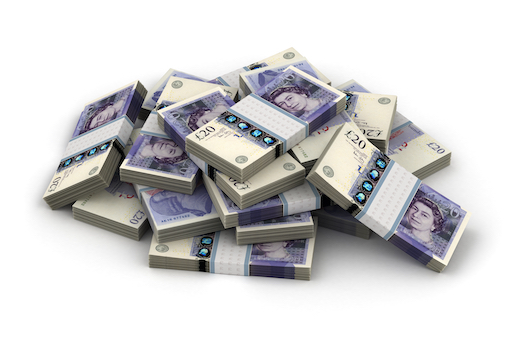Sterling Weakness
I don’t need to tell you that the pound is weaker than it has been for a very long time. What I would like to add is that it’s not all about UK party politics, where much of the main stream media are suggesting policy mistakes have “crashed” the value of the pound. Certainly Sterling fell against all currencies after the budget announcements, but it was a fall that came on top of a weakening of all currencies against an incredibly strong US dollar. Last month I blogged about the strength of the US dollar when it surrendered some of its recent gains which allowed all other assets to briefly rise in value. Only when the strength of the Dollar pauses, will we see a rise in value of our savings. We need to endure a little more pain before the pendulum swings.
| Sterling v Dollar | Euro v Dollar | Sterling v Euro | |
| 5 Day | -5.71% | -3.69% | -1.83% |
| 1 Month | -7.90% | -3.42% | -4.37% |
| 3 Month | -12.11% | -8.79% | -3.40% |
| YTD | -20.30% | -15.11% | -5.88% |
| 1 Year | -21.29% | -17.45% | -4.41% |
FED up
Last week the US Federal Reserve Bank actually delivered mixed news, but the investment markets were battered never the less. It raised the interest rate by (only) 0.75% as some of their short term data confirmed the US overheated economy was actually slowing down and cooling. Many commentators, including the FED, had previously suggested a full 1% was likely and already baked in. So good news.
However they followed this moderate rate rise with a narrative of further worsening predictions. The highest expected level of the base rate required was raised (up by a further 0.3% to 4.4% at the peak) and over a longer duration as inflation appeared to be stickier than recently thought. Interest rates were projected to be still at 4.6% by the end of 2023. So bad news. Base rate falling anytime in 2023 looks suddenly of the cards.
But look again, the good news was based on solid data, the bad news is just a projection. Neither the FED nor The Bank of England have ever been known as being deadly accurate in their forward projections. Their projections are rarely correct with the benefit of hindsight. They must both however stick to the same hymn-sheet and talk in strong pessimistic language to ensure their message continues to be heard to reduce the number of individuals buying goods and services at inflated prices. Less demand equals lower prices. There is little point in saying everything is going to be OK at this point.
Epicentre
The strong dollar is acting like a tornado, continuing to suck in spare cash from around the world where other currencies interest rates are lower. The only way to benefit from a strong dollar is to own dollars and dollar denominated assets, but only up to a point. Then at that point the fear arrives that the dollar is too strong, and so likely must fall in value and weaken. Then surprise, surprise, global spare cash finds new homes in cheaper currencies like the Euro and yes, Sterling. Long term balance is restored.
Let’s be clear about this. EVERYTHING is weakened when the dollar strengthens. Sterling, the Euro, the Yen – in fact most every global currency. Also a strong dollar brings down the price of Gold (in fact every precious metal), Oil (although it isn’t quite so visible with the push up factor of the Russian invasion of Ukraine, coupled with the pull down factor of a future global recession cutting demand) and most basic raw material commodities. Why? Because all of the above either compete with the dollar or are denominated in dollars like gold and oil.
A strong dollar eventually hurts US exports as they become more expensive in every other currency, the US becomes uncompetitive and manufacturing and service jobs are lost. Unemployment rises and the FED becomes under pressure as it has failed against its mandate of steady employment levels.
But let’s be honest. What is there currently to dislike about the US as an investor?
US Strength
- Energy independent. Strong exports of oil and natural gas to Europe now.
- At a distance from the war in Eastern Europe but benefitting from the uncertainty in Europe.
- Technologically advanced.
- Huge domestic markets. The US is the home of the consumer.
- Global reserve currency.
- Ownership of almost every on-line platform used globally. Microsoft, Amazon, Ebay, Apple, Facebook, Google.
- Home to the largest companies on the planet, many in the list above. The value of Apple exceeds every FTSE100 company added together.
- Home to 60% of the worlds investors.
- Democratically elected parliament. Unlike the second largest power block China.
It is not surprising that our best performing portfolio invests almost entirely in US companies. The individual shares have fallen in value like the rest of world but our ownership of dollar denominated assets has carried with it the tailwind of 20% currency appreciation when valued in Sterling. Unfortunately for many clients the combination of assets held in a single market only and the currency risk (can rise as well as fall) makes the Go For Growth Global portfolio unsuitable for clients with only a moderate attitude to investment risk.
What is my central expectation?
The FED can only continue to catch a hold of inflation up to the point unemployment ticks up. Currently the employment market is only just starting to show signs of weakness. It’s likely that the FED will need to raise rates further, then pivot and drop to save jobs, with perhaps a further smaller second series of rate rises to finally get inflation under control. A two step process. Same in the UK, because as bad as the news is right now, I have no evidence of individuals loosing their jobs yet. Neither the US or the UK looks like it is anywhere near recession yet.
The majority of the energy hardship that UK citizens would have endured has been diluted, in Europe it is hard to see how they don’t struggle politically through this period as shortages bite. There seems to have been a significant fight back staged by the forces in the Ukraine. I cannot decide whether this weakening of Russian ground forces is a good thing or a precursor to something much more sinister.
Can I see an end to the relentless falls in savings values this year?
Well, there are a few indicators building right now that suggest September/October could be towards the bottom of this cycle. Unfortunately I said similar last month too and we have dropped further since.
- The US first saw weakness in the more speculative end of its Stockmarket 19 months ago now. It had steadied before the FEDs recent announcement and hopefully will probably steady back up within a week or so.
- Many hedge funds have bets against the market rising to protect the assets they still are holding onto. These are called puts. They are purchased options to buy shares at a lower price in the future and are in effect a “bet”. (It’s complicated and the explanation is too long for this blog) The ratio of puts to callls is now at historic highs. Almost every time they reach this level to the downside, a strong uptick in market values follows. It is a reliable contra-indicator.
- Seasonality plays its part. September and October are usually the most volatile months of the year, followed by uplifts through to April/May time.
- US political cycles usually end with a strong performing stock market. We are entering the crucial mid-term period where markets traditionally strengthen from here.
- Similarly in the UK it’s important for the Conservatives to start to look better from here as we close in on 2024.
- Every correction previously ended at some unknown point and then went on to recover to ever greater highs.
In Conclusion
I believe we have endured the worst of this cyclical correction so far and the next couple of years should see our savings reach their former levels. We don’t need recessions to end to achieve this recovery, we simply need the expectation of recessions ending to bring much of the well needed catch up. Hopefully all of my clients have sufficient savings to take these rough periods in their stride and look back towards more usual investment returns.


Brilliant concise snap shot Howard . It was great to get a more balanced view than that given to us by the BBC news feeds and the headline grabbing Times which always take the here and now and never the longer term position.
Thanks Chris
It’s easy to take the here and now and project forward to either doom or riches. The reality is always the opposite. When values are too high they always fall, when they fall too far they always recover. We will look back at this time in the future as a blip along the way. The problem is the mainstream media like the BBC and The Times are never brought to book for their fear-mongering. Vote with your feet, cancel your subscriptions. I find “Un-heard” is far more balanced on most topics and the comments are from folks who have been around the block.
thanks howard well explained
Thanks for your calm, informed and knowledgeable assessment Howard .It is very welcome.